Deck 4: Graphing and Optimization
Question
Question
Question
Question
Question
Question
Question
Question
Question
Question
Question
Question
Question
Question
Question
Question
Question
Question
Question
Question
Question
Question
Question
Question
Question
Question
Question
Question
Question
Question
Question
Question
Question
Question
Question
Question
Question
Question
Question
Question
Question
Question
Question
Question
Question
Question
Question
Question
Question
Question
Question
Question
Question
Question
Question
Question
Question
Question
Question
Question
Question
Question
Question
Question
Question
Question
Question
Question
Question
Question
Question
Question
Question
Question
Question
Question
Question
Question
Question
Question

Unlock Deck
Sign up to unlock the cards in this deck!
Unlock Deck
Unlock Deck
1/116
Play
Full screen (f)
Deck 4: Graphing and Optimization
1
Provide an appropriate response.
Identify the intervals where f‛(x) > 0.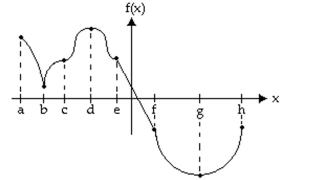
Identify the intervals where f‛(x) > 0.

(b, d), (g, h)
2
Provide an appropriate response.
Use the first derivative test to determine the local extrema, if any, for the function:
A) local min at x = 0 and local max at x = -1 and x = 1
B) local max at x = 0 and local min at x = -1 and x = 1
C) local max at x = 1 and local min at x = 0
D) local max at x = -1 and local min at x = 0 and x = 1
Use the first derivative test to determine the local extrema, if any, for the function:

A) local min at x = 0 and local max at x = -1 and x = 1
B) local max at x = 0 and local min at x = -1 and x = 1
C) local max at x = 1 and local min at x = 0
D) local max at x = -1 and local min at x = 0 and x = 1
local max at x = 0 and local min at x = -1 and x = 1
3
Provide an appropriate response.
Identify the intervals where f(x) is decreasing.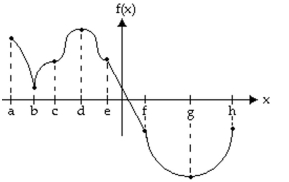
Identify the intervals where f(x) is decreasing.

(a, b), (d, g)
4
Provide an appropriate response.
Find the critical values and determine the intervals where f(x) is increasing and f(x) is decreasing if
A) decreasing on
decreasing on 
B)
C)
D)
Find the critical values and determine the intervals where f(x) is increasing and f(x) is decreasing if

A)
 decreasing on
decreasing on 
B)

C)

D)


Unlock Deck
Unlock for access to all 116 flashcards in this deck.
Unlock Deck
k this deck
5
Provide an appropriate response.
Write the sign chart that corresponds to the following graph of f(x)::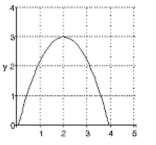
Write the sign chart that corresponds to the following graph of f(x)::


Unlock Deck
Unlock for access to all 116 flashcards in this deck.
Unlock Deck
k this deck
6
Provide an appropriate response.
Find the critical values and determine the intervals where f(x) is decreasing and the intervals where f(x) is increasing for
A)
B)
C)
D)
Find the critical values and determine the intervals where f(x) is decreasing and the intervals where f(x) is increasing for

A)

B)

C)

D)


Unlock Deck
Unlock for access to all 116 flashcards in this deck.
Unlock Deck
k this deck
7
Provide an appropriate response.
Find the critical values and determine the intervals where f(x) is decreasing for f(x) = 3(x - 4)2/3 + 6.
A)
B)
C)
D)
Find the critical values and determine the intervals where f(x) is decreasing for f(x) = 3(x - 4)2/3 + 6.
A)

B)

C)

D)


Unlock Deck
Unlock for access to all 116 flashcards in this deck.
Unlock Deck
k this deck
8
Provide an appropriate response.
Use a graphing utility to approximate where the local extrema of the function are to two decimal places.
are to two decimal places.
A)
B)
C)
D)
Use a graphing utility to approximate where the local extrema of the function
 are to two decimal places.
are to two decimal places.A)

B)

C)

D)


Unlock Deck
Unlock for access to all 116 flashcards in this deck.
Unlock Deck
k this deck
9
Provide an appropriate response.
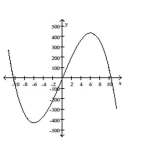
A)
B)
C)
D)

A)

B)

C)

D)


Unlock Deck
Unlock for access to all 116 flashcards in this deck.
Unlock Deck
k this deck
10
Provide an appropriate response.
Determine the interval(s) where is decreasing.
is decreasing.
A) (0, 6)
B) (0, 3) and (3, 6)
C)
D) (0, 3) and (6, ∞)
Determine the interval(s) where
 is decreasing.
is decreasing.A) (0, 6)
B) (0, 3) and (3, 6)
C)

D) (0, 3) and (6, ∞)

Unlock Deck
Unlock for access to all 116 flashcards in this deck.
Unlock Deck
k this deck
11
Provide an appropriate response.
Write the sign chart that corresponds to the following graph of f(x):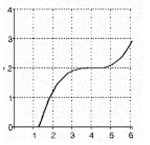
Write the sign chart that corresponds to the following graph of f(x):


Unlock Deck
Unlock for access to all 116 flashcards in this deck.
Unlock Deck
k this deck
12
Provide an appropriate response.
Given find the values of x corresponding to local maxima and local minima.
find the values of x corresponding to local maxima and local minima.
A) local minimum at x = -4 (no local maximum)
B) local maximum at x = -4, local minimum at x = 4
C) no local maximum or minimum
D) local maximum at x = -4 (no local minimum)
Given
 find the values of x corresponding to local maxima and local minima.
find the values of x corresponding to local maxima and local minima.A) local minimum at x = -4 (no local maximum)
B) local maximum at x = -4, local minimum at x = 4
C) no local maximum or minimum
D) local maximum at x = -4 (no local minimum)

Unlock Deck
Unlock for access to all 116 flashcards in this deck.
Unlock Deck
k this deck
13
Provide an appropriate response.
The critical values of are x = -2 and x = 2. Use the first derivative test to determine which of the critical values correspond to a local maximum.
are x = -2 and x = 2. Use the first derivative test to determine which of the critical values correspond to a local maximum.
A) x = - 2
B) x = 2
C) x = 0 and x = 2
D) x = 2 and x = - 2
The critical values of
 are x = -2 and x = 2. Use the first derivative test to determine which of the critical values correspond to a local maximum.
are x = -2 and x = 2. Use the first derivative test to determine which of the critical values correspond to a local maximum.A) x = - 2
B) x = 2
C) x = 0 and x = 2
D) x = 2 and x = - 2

Unlock Deck
Unlock for access to all 116 flashcards in this deck.
Unlock Deck
k this deck
14
Provide an appropriate response.
Use the first derivative test to determine the local extrema, if any, for the function:
A) local min at x = 2
B) local max at x = - 4 and local min at x = 2
C) local max at x = 2 and local min at - 4
D) local max at x = - 4
Use the first derivative test to determine the local extrema, if any, for the function:

A) local min at x = 2
B) local max at x = - 4 and local min at x = 2
C) local max at x = 2 and local min at - 4
D) local max at x = - 4

Unlock Deck
Unlock for access to all 116 flashcards in this deck.
Unlock Deck
k this deck
15
Provide an appropriate response.
Find the critical values and determine the intervals where f(x) is increasing and the intervals where f(x) is decreasing for the function
A) decreasing on (-4, 2)
decreasing on (-4, 2)
B) decreasing on (
decreasing on ( 
C) decreasing on (-4, 2)
decreasing on (-4, 2)
D) increasing on (-4, 2)
increasing on (-4, 2)
Find the critical values and determine the intervals where f(x) is increasing and the intervals where f(x) is decreasing for the function

A)
 decreasing on (-4, 2)
decreasing on (-4, 2)B)
 decreasing on (
decreasing on ( 
C)
 decreasing on (-4, 2)
decreasing on (-4, 2)D)
 increasing on (-4, 2)
increasing on (-4, 2)
Unlock Deck
Unlock for access to all 116 flashcards in this deck.
Unlock Deck
k this deck
16
Provide an appropriate response.
Use a graphing utility to approximate the intervals where f(x) is decreasing and intervals where f(x) is increasing for the function Round your answer to two decimal places.
Round your answer to two decimal places.
A) decreasing on (-0.82, 0.62)
decreasing on (-0.82, 0.62)
B) and (0.62, 2.45); increasing on (-0.82, 0.62) and (2.45, ∞)
and (0.62, 2.45); increasing on (-0.82, 0.62) and (2.45, ∞)
C) ) and (0.62, 2.45); decreasing on (-0.82, 0.62) and (2.45, ∞)
) and (0.62, 2.45); decreasing on (-0.82, 0.62) and (2.45, ∞)
D) increasing on (-0.82, 0.62)
increasing on (-0.82, 0.62)
Use a graphing utility to approximate the intervals where f(x) is decreasing and intervals where f(x) is increasing for the function
 Round your answer to two decimal places.
Round your answer to two decimal places.A)
 decreasing on (-0.82, 0.62)
decreasing on (-0.82, 0.62)B)
 and (0.62, 2.45); increasing on (-0.82, 0.62) and (2.45, ∞)
and (0.62, 2.45); increasing on (-0.82, 0.62) and (2.45, ∞)C)
 ) and (0.62, 2.45); decreasing on (-0.82, 0.62) and (2.45, ∞)
) and (0.62, 2.45); decreasing on (-0.82, 0.62) and (2.45, ∞)D)
 increasing on (-0.82, 0.62)
increasing on (-0.82, 0.62)
Unlock Deck
Unlock for access to all 116 flashcards in this deck.
Unlock Deck
k this deck
17
Provide an appropriate response.
The critical values of are x = -2 and x = 2. Use the first derivative test to determine which of the critical values correspond to a local minimum.
are x = -2 and x = 2. Use the first derivative test to determine which of the critical values correspond to a local minimum.
A) x = 2 and x = -2
B) neither x = 2 nor x = -2 correspond to a local minimum
C) x = -2
D) x = 2
The critical values of
 are x = -2 and x = 2. Use the first derivative test to determine which of the critical values correspond to a local minimum.
are x = -2 and x = 2. Use the first derivative test to determine which of the critical values correspond to a local minimum.A) x = 2 and x = -2
B) neither x = 2 nor x = -2 correspond to a local minimum
C) x = -2
D) x = 2

Unlock Deck
Unlock for access to all 116 flashcards in this deck.
Unlock Deck
k this deck
18
Provide an appropriate response.
Use the first derivative test to determine the local extrema, if any, for the function:
A) f(x) has a local maximum at x = 4.
B) f(x) has a local minimum at x = 4.
C) f(x) has no local extrema
D) f(x) has a local minimum at 6
Use the first derivative test to determine the local extrema, if any, for the function:

A) f(x) has a local maximum at x = 4.
B) f(x) has a local minimum at x = 4.
C) f(x) has no local extrema
D) f(x) has a local minimum at 6

Unlock Deck
Unlock for access to all 116 flashcards in this deck.
Unlock Deck
k this deck
19
Provide an appropriate response.
Determine the intervals for which the function is decreasing.
is decreasing.
A)
B) (0, 12) and (12, ∞)
C) (-12, 0)
D)
Determine the intervals for which the function
 is decreasing.
is decreasing.A)

B) (0, 12) and (12, ∞)
C) (-12, 0)
D)


Unlock Deck
Unlock for access to all 116 flashcards in this deck.
Unlock Deck
k this deck
20
Provide an appropriate response.
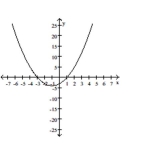
A)
B)
C)
D)

A)

B)

C)

D)


Unlock Deck
Unlock for access to all 116 flashcards in this deck.
Unlock Deck
k this deck
21
Solve the problem.
The percent of concentration of a certain drug in the bloodstream x hr after the drug is administered is given by How long after the drug has been administered is the concentration a maximum? Round answer to the nearest tenth, if necessary.
How long after the drug has been administered is the concentration a maximum? Round answer to the nearest tenth, if necessary.
A) 7 hr
B) 2 hr
C) 2.5 hr
D) 4.9 hr
The percent of concentration of a certain drug in the bloodstream x hr after the drug is administered is given by
 How long after the drug has been administered is the concentration a maximum? Round answer to the nearest tenth, if necessary.
How long after the drug has been administered is the concentration a maximum? Round answer to the nearest tenth, if necessary.A) 7 hr
B) 2 hr
C) 2.5 hr
D) 4.9 hr

Unlock Deck
Unlock for access to all 116 flashcards in this deck.
Unlock Deck
k this deck
22
Solve the problem.
With x representing the water temperature in degrees Celsius, approximation to the number of salmon swimming upstream to spawn. Find the temperature that produces the maximum number of salmon.
approximation to the number of salmon swimming upstream to spawn. Find the temperature that produces the maximum number of salmon.
A) 6°C
B) 20°C
C) 19°C
D) 5°C
With x representing the water temperature in degrees Celsius,
 approximation to the number of salmon swimming upstream to spawn. Find the temperature that produces the maximum number of salmon.
approximation to the number of salmon swimming upstream to spawn. Find the temperature that produces the maximum number of salmon.A) 6°C
B) 20°C
C) 19°C
D) 5°C

Unlock Deck
Unlock for access to all 116 flashcards in this deck.
Unlock Deck
k this deck
23
Find the intervals where f''(x) < 0 ir f''(x) > 0 as indicated.
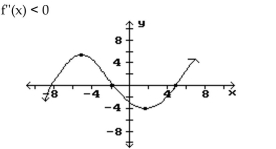
A) (-5, 2)
B)
C) (-5, 5)
D)

A) (-5, 2)
B)

C) (-5, 5)
D)


Unlock Deck
Unlock for access to all 116 flashcards in this deck.
Unlock Deck
k this deck
24
Sketch a graph of the function.
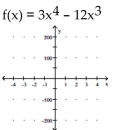
A)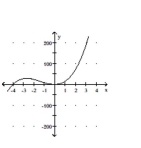
B)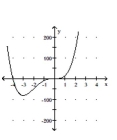
C)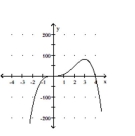
D)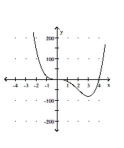

A)

B)

C)

D)


Unlock Deck
Unlock for access to all 116 flashcards in this deck.
Unlock Deck
k this deck
25
Find the intervals where the function has the indicated concavity. Give the x coordinates of inflection points.
Concave upward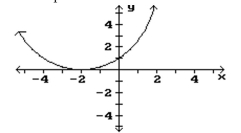
A)
B)
C)
D)
Concave upward

A)

B)

C)

D)


Unlock Deck
Unlock for access to all 116 flashcards in this deck.
Unlock Deck
k this deck
26
Sketch a graph of the function.
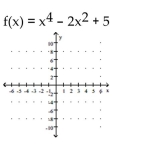
A)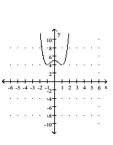
B)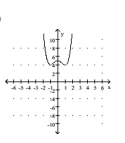
C)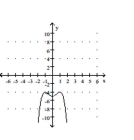
D)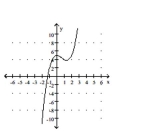

A)

B)

C)

D)


Unlock Deck
Unlock for access to all 116 flashcards in this deck.
Unlock Deck
k this deck
27
Find the intervals where the function has the indicated concavity. Give the x coordinates of inflection points.
Concave downward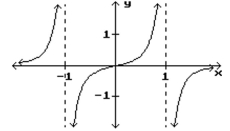
A)
B)
C) (-1, 0); no inflection points
D)
Concave downward

A)

B)

C) (-1, 0); no inflection points
D)


Unlock Deck
Unlock for access to all 116 flashcards in this deck.
Unlock Deck
k this deck
28
Sketch a graph of a single function that has these properties.
a) Continuous and differentiable for all real numbers
b)
c)
d)
e)
f)
g) An inflection point at (0,0)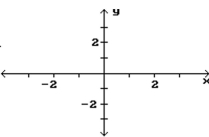
a) Continuous and differentiable for all real numbers
b)

c)

d)

e)

f)

g) An inflection point at (0,0)


Unlock Deck
Unlock for access to all 116 flashcards in this deck.
Unlock Deck
k this deck
29
Sketch a graph of the function.
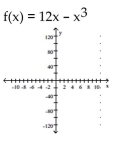
A)
B)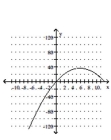
C)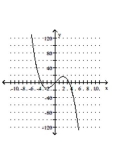
D)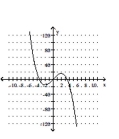

A)

B)

C)

D)


Unlock Deck
Unlock for access to all 116 flashcards in this deck.
Unlock Deck
k this deck
30
Sketch a graph of the function.
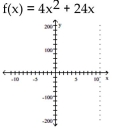
A)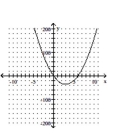
B)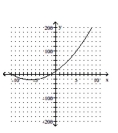
C)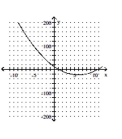
D)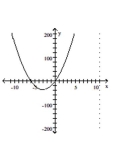

A)

B)

C)

D)


Unlock Deck
Unlock for access to all 116 flashcards in this deck.
Unlock Deck
k this deck
31
Sketch a graph of the function.
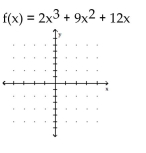
A)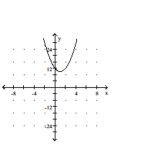
B)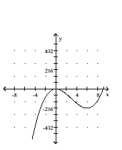
C)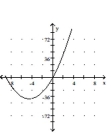
D)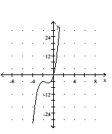

A)

B)

C)

D)


Unlock Deck
Unlock for access to all 116 flashcards in this deck.
Unlock Deck
k this deck
32
Solve the problem.
The cost of manufacturing x electric woks in one day is given by C(x) = 2x3 -16x2 + 4x. Find the average cost per electric wok and the interval where the average cost per electric wok is decreasing.
A)
B)
C)
D)
The cost of manufacturing x electric woks in one day is given by C(x) = 2x3 -16x2 + 4x. Find the average cost per electric wok and the interval where the average cost per electric wok is decreasing.
A)

B)

C)

D)


Unlock Deck
Unlock for access to all 116 flashcards in this deck.
Unlock Deck
k this deck
33
Sketch a graph of a single function that has these properties.
Find
A)
B)
C)
D)
Find

A)

B)

C)

D)


Unlock Deck
Unlock for access to all 116 flashcards in this deck.
Unlock Deck
k this deck
34
Find the intervals where f''(x) < 0 ir f''(x) > 0 as indicated.
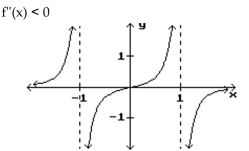
A)
B)
C)
D) (-1, 0)

A)

B)

C)

D) (-1, 0)

Unlock Deck
Unlock for access to all 116 flashcards in this deck.
Unlock Deck
k this deck
35
Solve the problem.
The annual revenue and cost functions for a manufacturer of grandfather clocks are approximately where x denotes the number of clocks made. What is the maximum annual profit?
where x denotes the number of clocks made. What is the maximum annual profit?
A) $553,333
B) $753,333
C) $653,333
D) $853,333
The annual revenue and cost functions for a manufacturer of grandfather clocks are approximately
 where x denotes the number of clocks made. What is the maximum annual profit?
where x denotes the number of clocks made. What is the maximum annual profit?A) $553,333
B) $753,333
C) $653,333
D) $853,333

Unlock Deck
Unlock for access to all 116 flashcards in this deck.
Unlock Deck
k this deck
36
Sketch a graph of a single function that has these properties.
a) Continuous and differentiable for all real numbers
b)
c) ) and ( -1 , 2)
) and ( -1 , 2)
d)
e)
f)
g)
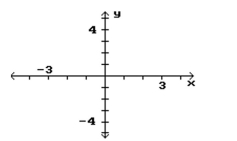
a) Continuous and differentiable for all real numbers
b)

c)
 ) and ( -1 , 2)
) and ( -1 , 2)d)

e)

f)

g)



Unlock Deck
Unlock for access to all 116 flashcards in this deck.
Unlock Deck
k this deck
37
Find the intervals where f''(x) < 0 ir f''(x) > 0 as indicated.
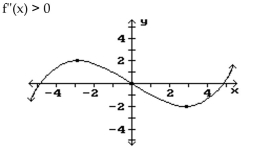
A) (-3, 3)
B)
C)
D) (0, 3)

A) (-3, 3)
B)

C)

D) (0, 3)

Unlock Deck
Unlock for access to all 116 flashcards in this deck.
Unlock Deck
k this deck
38
Find the intervals where the function has the indicated concavity. Give the x coordinates of inflection points.
Concave downward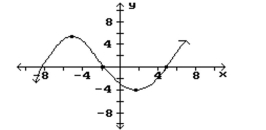
A)
B) (-5, 2); x = 0
C) (-5, 5); no inflection points
D)
Concave downward

A)

B) (-5, 2); x = 0
C) (-5, 5); no inflection points
D)


Unlock Deck
Unlock for access to all 116 flashcards in this deck.
Unlock Deck
k this deck
39
Solve the problem.
The Olympic flame at the 1992 Summer Olympics was lit by a flaming arrow. As the arrow moved d feet horizontally from the archer, assume that its height h(d), in feet, was approximated by the function Find the relative maximum of the function.
Find the relative maximum of the function.
A) (0, 6.9)
B) (175, 61.25)
C) (350, 129.4)
D) (175, 68.15)
The Olympic flame at the 1992 Summer Olympics was lit by a flaming arrow. As the arrow moved d feet horizontally from the archer, assume that its height h(d), in feet, was approximated by the function
 Find the relative maximum of the function.
Find the relative maximum of the function.A) (0, 6.9)
B) (175, 61.25)
C) (350, 129.4)
D) (175, 68.15)

Unlock Deck
Unlock for access to all 116 flashcards in this deck.
Unlock Deck
k this deck
40
Find the intervals where the function has the indicated concavity. Give the x coordinates of inflection points.
Concave upward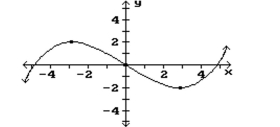
A)
B)
C)
D)
Concave upward

A)

B)

C)

D)


Unlock Deck
Unlock for access to all 116 flashcards in this deck.
Unlock Deck
k this deck
41
Sketch a graph of a single function that has these properties.
Find
A)
B)
C)
D)
Find

A)

B)

C)

D)


Unlock Deck
Unlock for access to all 116 flashcards in this deck.
Unlock Deck
k this deck
42
Sketch a graph of a single function that has these properties.
Determine the interval(s) over which is concave downward.
is concave downward.
A)
B)
C)
D)
Determine the interval(s) over which
 is concave downward.
is concave downward.A)

B)

C)

D)


Unlock Deck
Unlock for access to all 116 flashcards in this deck.
Unlock Deck
k this deck
43
Sketch a graph of a single function that has these properties.
Find
A)
B)
C)
D)
Find

A)

B)

C)

D)


Unlock Deck
Unlock for access to all 116 flashcards in this deck.
Unlock Deck
k this deck
44
Sketch a graph of a single function that has these properties.
Find all inflection points for
A)
B) Inflection points at x = 1, x = 4
C) Inflection points at x = 0, x = 1, x = 4
D) This function does not have any inflection points.
Find all inflection points for

A)

B) Inflection points at x = 1, x = 4
C) Inflection points at x = 0, x = 1, x = 4
D) This function does not have any inflection points.

Unlock Deck
Unlock for access to all 116 flashcards in this deck.
Unlock Deck
k this deck
45
Decide if the given value of x is a critical number for f, and if so, decide whether the point for x on f is a local minimum,
local maximum, or neither.

A) Critical number; minimum at (-4 , 0)
B) Critical number; maximum at (-4 , 0)
C) Not a critical number.
D) Critical number but not an extreme point.
local maximum, or neither.

A) Critical number; minimum at (-4 , 0)
B) Critical number; maximum at (-4 , 0)
C) Not a critical number.
D) Critical number but not an extreme point.

Unlock Deck
Unlock for access to all 116 flashcards in this deck.
Unlock Deck
k this deck
46
Sketch the graph and show all local extrema and inflection points.

A)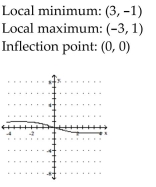
B)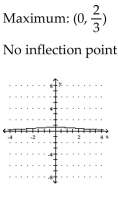
C)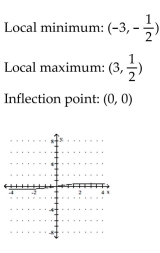
D)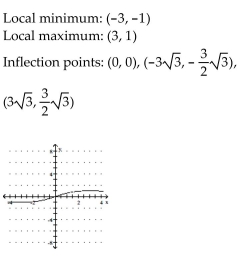

A)

B)

C)

D)


Unlock Deck
Unlock for access to all 116 flashcards in this deck.
Unlock Deck
k this deck
47
Sketch a graph of a single function that has these properties.
Find
A)
B)
C)
D)
Find

A)

B)

C)

D)


Unlock Deck
Unlock for access to all 116 flashcards in this deck.
Unlock Deck
k this deck
48
Sketch the graph and show all local extrema and inflection points.
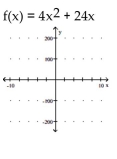
A)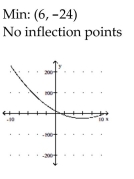
B)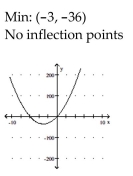
C)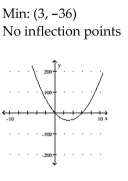
D)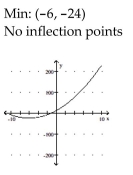

A)

B)

C)

D)


Unlock Deck
Unlock for access to all 116 flashcards in this deck.
Unlock Deck
k this deck
49
Solve the problem.
A backpack manufacturer is planning to expand its work force. They estimate that the number of backpacks
produced by hiring new workers is given by Determine when the rate of
Determine when the rate of
backpacks is increasing and when it is decreasing. Determine the point of diminishing returns and the
maximum rate of change of backpack production.
A backpack manufacturer is planning to expand its work force. They estimate that the number of backpacks
produced by hiring new workers is given by
 Determine when the rate of
Determine when the rate ofbackpacks is increasing and when it is decreasing. Determine the point of diminishing returns and the
maximum rate of change of backpack production.

Unlock Deck
Unlock for access to all 116 flashcards in this deck.
Unlock Deck
k this deck
50
Sketch a graph of a single function that has these properties.
Find
A)
B)
C)
D)
Find

A)

B)

C)

D)


Unlock Deck
Unlock for access to all 116 flashcards in this deck.
Unlock Deck
k this deck
51
Sketch a graph of a single function that has these properties.
Determine the interval(s) over which is concave upward.
is concave upward.
A)
B)
C)
D)
Determine the interval(s) over which
 is concave upward.
is concave upward.A)

B)

C)

D)


Unlock Deck
Unlock for access to all 116 flashcards in this deck.
Unlock Deck
k this deck
52
Sketch a graph of a single function that has these properties.
Find the inflection point(s) for
A)
B) (0, 6) and (2, 2)
C) (0, 0)
D) (0, 0) and (2, 2)
Find the inflection point(s) for

A)

B) (0, 6) and (2, 2)
C) (0, 0)
D) (0, 0) and (2, 2)

Unlock Deck
Unlock for access to all 116 flashcards in this deck.
Unlock Deck
k this deck
53
Sketch the graph and show all local extrema and inflection points.
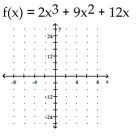
A)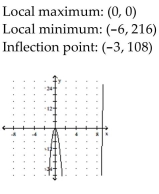
B)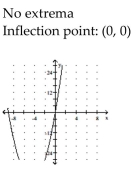
C)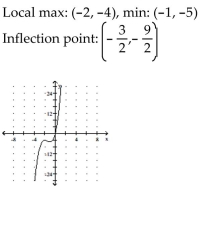
D)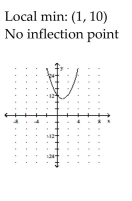

A)

B)

C)

D)


Unlock Deck
Unlock for access to all 116 flashcards in this deck.
Unlock Deck
k this deck
54
Sketch a graph of a single function that has these properties.
Find
A)
B)
C)
D)
Find

A)

B)

C)

D)


Unlock Deck
Unlock for access to all 116 flashcards in this deck.
Unlock Deck
k this deck
55
Sketch a graph of a single function that has these properties.
Find the inflection point(s) for
A) (0, -6)
B) (1, -1)
C) (-1, 6)
D) (0, -1)
Find the inflection point(s) for

A) (0, -6)
B) (1, -1)
C) (-1, 6)
D) (0, -1)

Unlock Deck
Unlock for access to all 116 flashcards in this deck.
Unlock Deck
k this deck
56
Sketch a graph of a single function that has these properties.
Find
A)
B)
C)
D)
Find

A)

B)

C)

D)


Unlock Deck
Unlock for access to all 116 flashcards in this deck.
Unlock Deck
k this deck
57
Solve the problem.
A company estimates that it will sell N(t) hair dryers after spending $t thousands on advertising as given by: For which values of t is the rate of sales N'(t) in
For which values of t is the rate of sales N'(t) in  creasing?
creasing?
A) 40 < t < 50
B) 50 < t < 60
C) 40 < t < 60
D) t > 40
A company estimates that it will sell N(t) hair dryers after spending $t thousands on advertising as given by:
 For which values of t is the rate of sales N'(t) in
For which values of t is the rate of sales N'(t) in  creasing?
creasing?A) 40 < t < 50
B) 50 < t < 60
C) 40 < t < 60
D) t > 40

Unlock Deck
Unlock for access to all 116 flashcards in this deck.
Unlock Deck
k this deck
58
Sketch the graph and show all local extrema and inflection points.
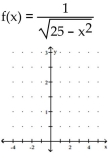
A)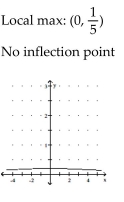
B)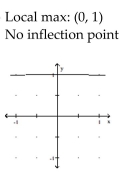
C)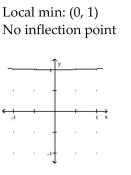
D)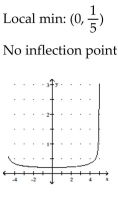

A)

B)

C)

D)


Unlock Deck
Unlock for access to all 116 flashcards in this deck.
Unlock Deck
k this deck
59
Sketch a graph of a single function that has these properties.
Find
A)
B)
C)
D)
Find

A)

B)

C)

D)


Unlock Deck
Unlock for access to all 116 flashcards in this deck.
Unlock Deck
k this deck
60
Sketch a graph of a single function that has these properties.
Find the inflection point(s) for
A) (-3, 2)
B) (-6, 1)
C) (-7, 0)
D) There are no points of inflection.
Find the inflection point(s) for

A) (-3, 2)
B) (-6, 1)
C) (-7, 0)
D) There are no points of inflection.

Unlock Deck
Unlock for access to all 116 flashcards in this deck.
Unlock Deck
k this deck
61
Find the limit, if it exists.
Find
A)
B) 0
C)
D) 1
Find

A)

B) 0
C)

D) 1

Unlock Deck
Unlock for access to all 116 flashcards in this deck.
Unlock Deck
k this deck
62
Sketch a graph of a single function that has these properties.

A) Domain: All real numbers except -9; y intercept: 0; x intercept: 0
B) y intercept: 0; x intercept: 0
y intercept: 0; x intercept: 0
C) Domain: All real numbers except 9; y intercept: 0; x intercept: 0
D) Domain: All real numbers except -9; y intercept: 0; no x intercept

A) Domain: All real numbers except -9; y intercept: 0; x intercept: 0
B)
 y intercept: 0; x intercept: 0
y intercept: 0; x intercept: 0C) Domain: All real numbers except 9; y intercept: 0; x intercept: 0
D) Domain: All real numbers except -9; y intercept: 0; no x intercept

Unlock Deck
Unlock for access to all 116 flashcards in this deck.
Unlock Deck
k this deck
63
Sketch a graph of the function.
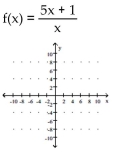
A)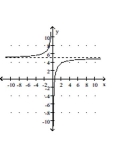
B)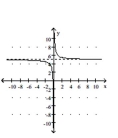
C)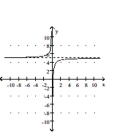
D)

A)

B)

C)

D)


Unlock Deck
Unlock for access to all 116 flashcards in this deck.
Unlock Deck
k this deck
64
Find the limit, if it exists.

A) -3
B)
C) 3
D)

A) -3
B)

C) 3
D)


Unlock Deck
Unlock for access to all 116 flashcards in this deck.
Unlock Deck
k this deck
65
Find the limit, if it exists.
Find
A)
B)
C) 0
D)
Find

A)

B)

C) 0
D)


Unlock Deck
Unlock for access to all 116 flashcards in this deck.
Unlock Deck
k this deck
66
Sketch a graph of a single function that has these properties.
a) Continuous for all real numbers
b) Differentiable everywhere except x = 0
c) d)
d)  e)
e)  f) f(-2) = f (2) = 5
f) f(-2) = f (2) = 5
g) y-intercept and x-intercept at (0, 0)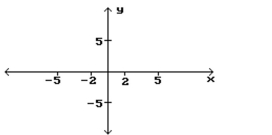
a) Continuous for all real numbers
b) Differentiable everywhere except x = 0
c)
 d)
d)  e)
e)  f) f(-2) = f (2) = 5
f) f(-2) = f (2) = 5g) y-intercept and x-intercept at (0, 0)


Unlock Deck
Unlock for access to all 116 flashcards in this deck.
Unlock Deck
k this deck
67
Sketch a graph of a single function that has these properties.

A) y intercept: 8; x intercept: -64
y intercept: 8; x intercept: -64
B) y intercept: -64; x intercept: 8
y intercept: -64; x intercept: 8
C) y intercept: 8; x intercept: -64
y intercept: 8; x intercept: -64
D) y intercept: 8; x intercept: -64
y intercept: 8; x intercept: -64

A)
 y intercept: 8; x intercept: -64
y intercept: 8; x intercept: -64B)
 y intercept: -64; x intercept: 8
y intercept: -64; x intercept: 8C)
 y intercept: 8; x intercept: -64
y intercept: 8; x intercept: -64D)
 y intercept: 8; x intercept: -64
y intercept: 8; x intercept: -64
Unlock Deck
Unlock for access to all 116 flashcards in this deck.
Unlock Deck
k this deck
68
Solve the problem.
Because of material shortages, it is increasingly expensive to produce 6.2L diesel engines. In fact, the profit in millions of dollars from producing x hundred thousand engines is approximated by Find the inflection point of this function to determine the point of
Find the inflection point of this function to determine the point of
Diminishing returns.
A) (7.50, 2048)
B) (10, 1958)
C) (10, 2048)
D) (10, 114.67)
Because of material shortages, it is increasingly expensive to produce 6.2L diesel engines. In fact, the profit in millions of dollars from producing x hundred thousand engines is approximated by
 Find the inflection point of this function to determine the point of
Find the inflection point of this function to determine the point ofDiminishing returns.
A) (7.50, 2048)
B) (10, 1958)
C) (10, 2048)
D) (10, 114.67)

Unlock Deck
Unlock for access to all 116 flashcards in this deck.
Unlock Deck
k this deck
69
Find the limit, if it exists.
Find:
A)
B)
C)
D)
Find:

A)

B)

C)

D)


Unlock Deck
Unlock for access to all 116 flashcards in this deck.
Unlock Deck
k this deck
70
Find the limit, if it exists.

A) -6
B) 0
C)
D)

A) -6
B) 0
C)

D)


Unlock Deck
Unlock for access to all 116 flashcards in this deck.
Unlock Deck
k this deck
71
Provide an appropriate response.
Find horizontal asymptotes, if any, for
A)
B) y = 0
C)
D)
Find horizontal asymptotes, if any, for

A)

B) y = 0
C)

D)


Unlock Deck
Unlock for access to all 116 flashcards in this deck.
Unlock Deck
k this deck
72
Find the limit, if it exists.
Find
A)
B) 0
C) 2
D)
Find

A)

B) 0
C) 2
D)


Unlock Deck
Unlock for access to all 116 flashcards in this deck.
Unlock Deck
k this deck
73
Find the limit, if it exists.
Find
A) 0
B)
C)
D)
Find

A) 0
B)

C)

D)


Unlock Deck
Unlock for access to all 116 flashcards in this deck.
Unlock Deck
k this deck
74
Find the limit, if it exists.
Find .
.
A) 3
B) 108
C) 0
D) 81
Find
 .
.A) 3
B) 108
C) 0
D) 81

Unlock Deck
Unlock for access to all 116 flashcards in this deck.
Unlock Deck
k this deck
75
Provide an appropriate response.
Sketch the graph of Include sketch of all asymptotes.
Include sketch of all asymptotes.
Sketch the graph of
 Include sketch of all asymptotes.
Include sketch of all asymptotes.
Unlock Deck
Unlock for access to all 116 flashcards in this deck.
Unlock Deck
k this deck
76
Provide an appropriate response.
Consider the function Determine the intervals where f(x) is increasing and decreasing,
Determine the intervals where f(x) is increasing and decreasing,
concave up and concave down and all local extrema. Use that information to obtain a sketch of the function.
Consider the function
 Determine the intervals where f(x) is increasing and decreasing,
Determine the intervals where f(x) is increasing and decreasing,concave up and concave down and all local extrema. Use that information to obtain a sketch of the function.

Unlock Deck
Unlock for access to all 116 flashcards in this deck.
Unlock Deck
k this deck
77
Provide an appropriate response.
Find vertical asymptotes for
A) x = 1, x = -4
B) x = -1, x = -4
C) x = 1, x = 4
D) x = -1, x = 4
Find vertical asymptotes for

A) x = 1, x = -4
B) x = -1, x = -4
C) x = 1, x = 4
D) x = -1, x = 4

Unlock Deck
Unlock for access to all 116 flashcards in this deck.
Unlock Deck
k this deck
78
Graph the function and locate intervals on which the function is increasing or decreasing, open intervals on which the
function is concave up or concave down, and all inflection points.

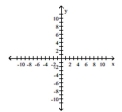
A)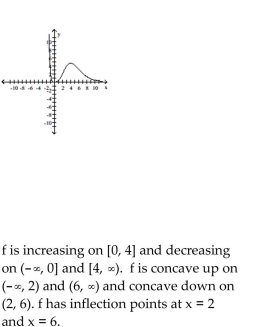
B)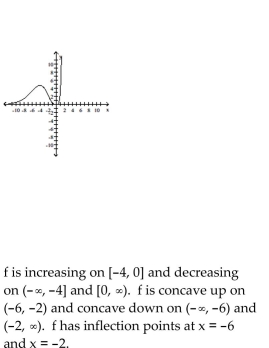
C)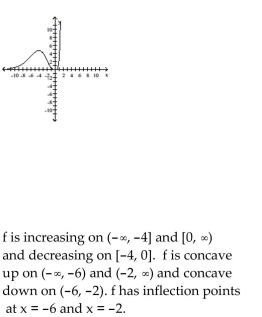
D)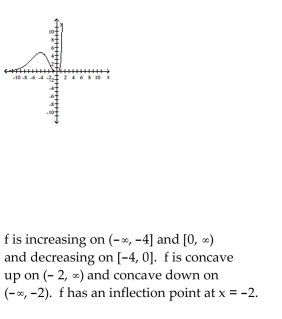
function is concave up or concave down, and all inflection points.


A)

B)

C)

D)


Unlock Deck
Unlock for access to all 116 flashcards in this deck.
Unlock Deck
k this deck
79
Sketch a graph of a single function that has these properties.
f(x) = 4x + 8
A) y intercept: 8; x intercept: -2
y intercept: 8; x intercept: -2
B) y intercept: -2; x intercept: 8
y intercept: -2; x intercept: 8
C) y intercept: 8; x intercept: -2
y intercept: 8; x intercept: -2
D) y intercept: 8; x intercept: 2
y intercept: 8; x intercept: 2
f(x) = 4x + 8
A)
 y intercept: 8; x intercept: -2
y intercept: 8; x intercept: -2B)
 y intercept: -2; x intercept: 8
y intercept: -2; x intercept: 8C)
 y intercept: 8; x intercept: -2
y intercept: 8; x intercept: -2D)
 y intercept: 8; x intercept: 2
y intercept: 8; x intercept: 2
Unlock Deck
Unlock for access to all 116 flashcards in this deck.
Unlock Deck
k this deck
80
Graph the function and locate intervals on which the function is increasing or decreasing, open intervals on which the
function is concave up or concave down, and all inflection points.
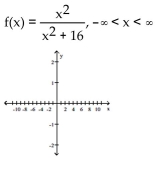
A)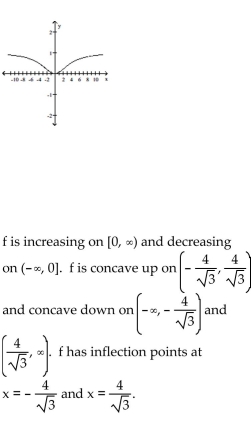
B)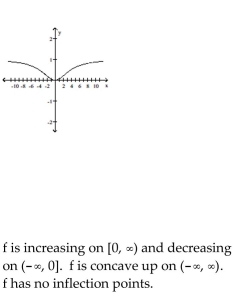
C)
D)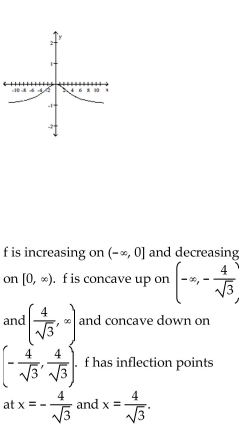
function is concave up or concave down, and all inflection points.

A)

B)

C)

D)


Unlock Deck
Unlock for access to all 116 flashcards in this deck.
Unlock Deck
k this deck



